Meet 23 German Shepherd Lab Mix Owners – The Realities of Sheprador Puppy Parenthood
I interviewed 20 German Shepherd Lab mix owners’ to get their experiences of this gorgeous hybrid. Helping you to decide whether the Sheprador is your ideal new puppy. Because deciding whether a particular mixed breed is the right fit for your family can be a little overwhelming. And having some real world examples of life with the dog you’re considering can help to seal the deal, or to move your search on to a more appropriate pup.
The Sheprador is a German Shepherd Lab mix. An intelligent, active combination of herd protection dog the German Shepherd and fieldwork companion the Labrador Retriever. These are both intelligent, medium to large sized dogs with a high energy level. But their natures differ a lot when it comes to guarding behavior, and they both have potential health issues to contend with.
So what do Sheprador families have to say about this beautiful mixed breed?
- Meet the Sheprador families.
- Coat care, shedding and grooming.
- Behavior and training.
- Pros and cons of life with your German Shepherd Lab mix.

Watch out for bias
Before you dive into the highs and lows of the German Shepherd Lab mix, it’s good to remember to take these stories for what they are. Individual experiences. Although we can learn a lot about a breed from specific examples, surveys have an inherent bias. Participants are more likely to fill them out when they’ve had an extreme experience. So you are always going to get more responses from those who absolutely adore everything about the dog, or suffered through some challenges, than you will from those who were more neutral.
Meet the Shepradors!
Before we begin with the general trends from our reports, let’s get to know some of our Shepherd Lab mixes and their human companions.
Willow (owner Bev)
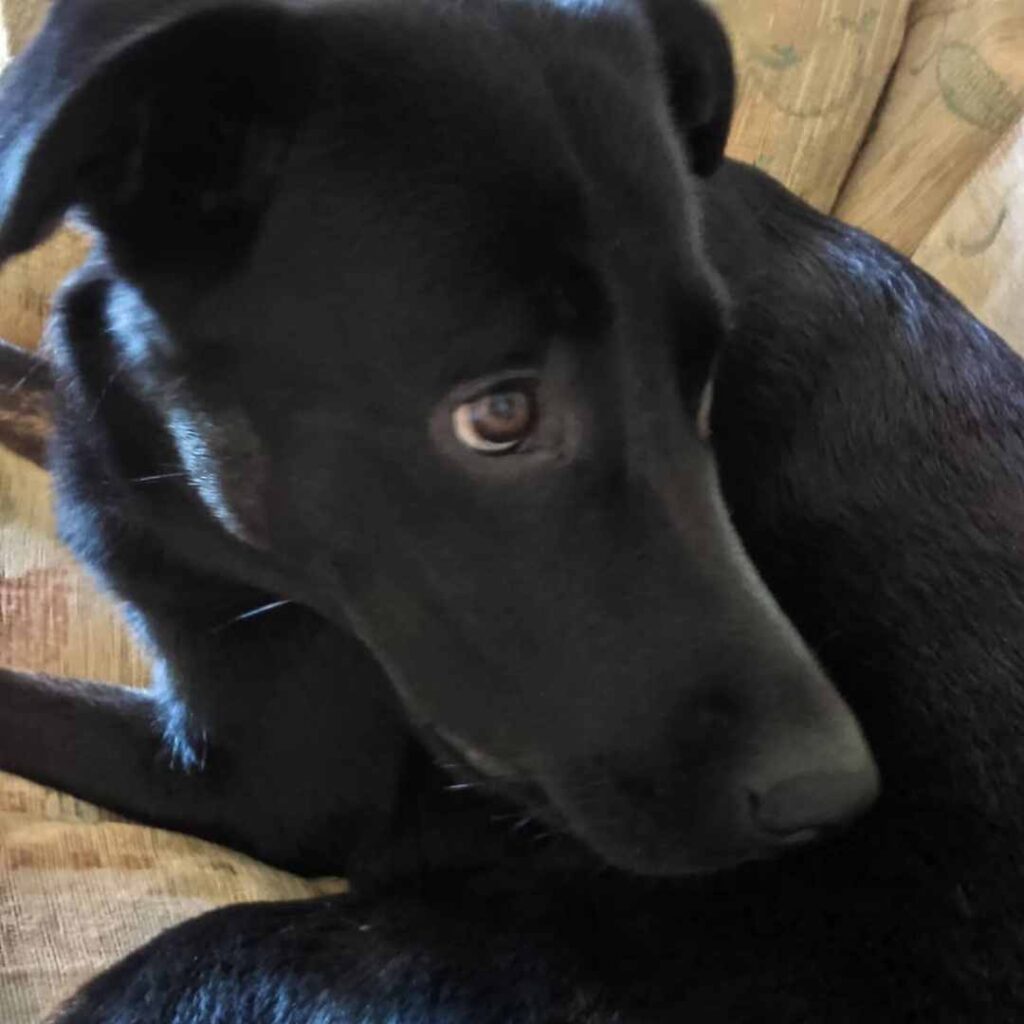
7 year old black female Willow is a brindle Shepherd Lab mix with markings on her legs. She looks more like a Labrador than a German Shepherd.
Willow is very excitable, especially when it’s time for walkies! She’s lovable, loves cuddles and will do anything for food! Although excited, she can be reactive if on lead. She wants to play with everyone, but not everyone wants to play with her! And gets angsty if she thinks another dog is trying to take her ball.
Pepper (owner Jeannette)
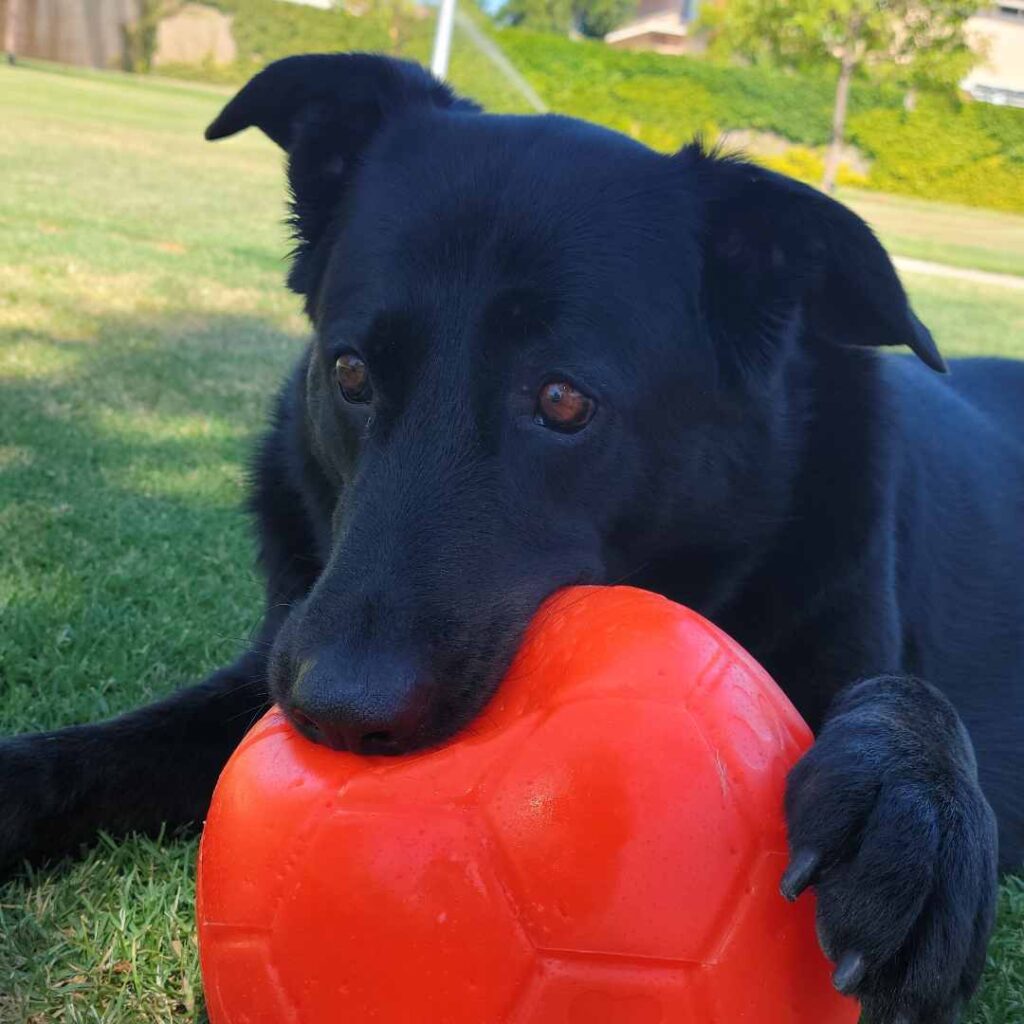
Pepper is a 7 year old black female Lab Shepherd mix. She resembles both dogs lab/shepard. She’s an active dog that bores easily.
Rocky
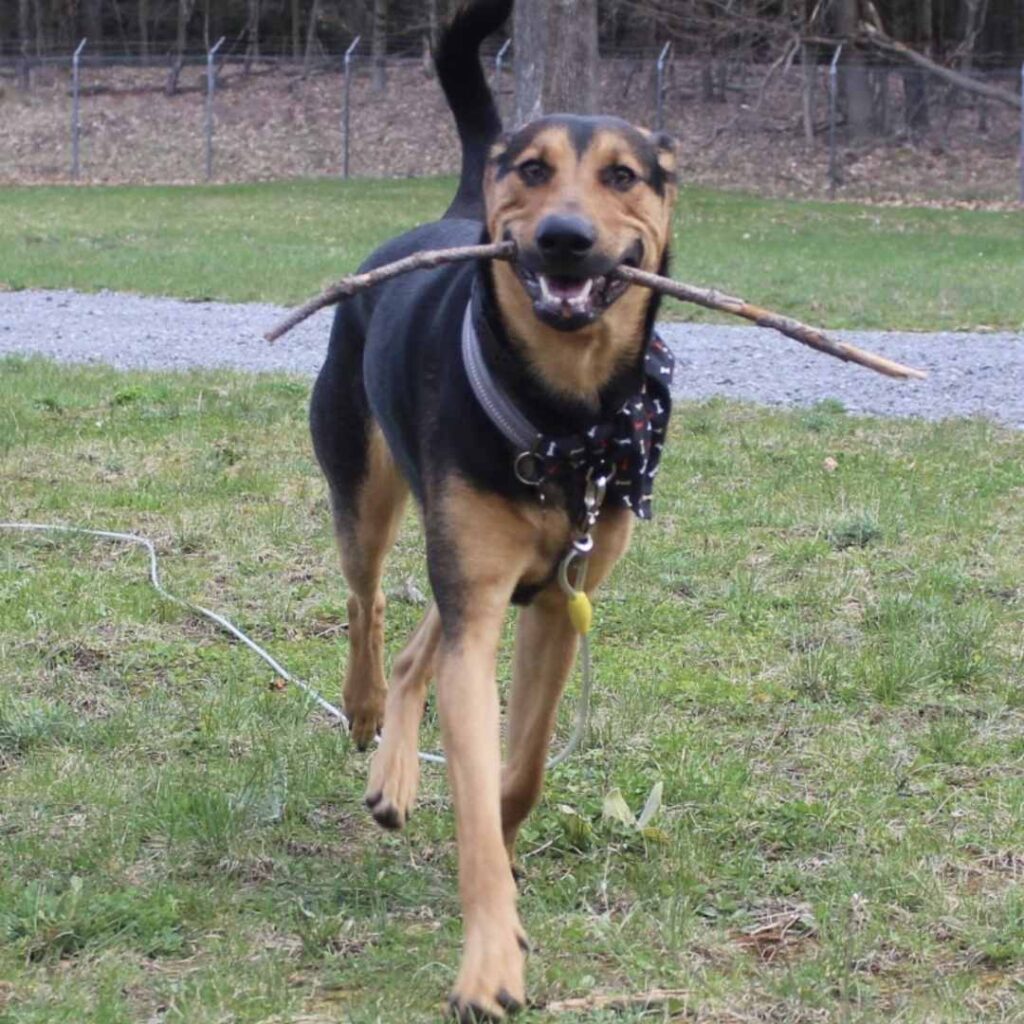
Male black and brown Rocky is 3 years old. He has the body of a Lab, but the coloring of a German Shepherd. Rocky loves to exercise and explore, is easily trainable and loyal. He is good with dogs, cats, and kids. He loves fetch and can play for hours.
He’s still a giant puppy and he tends to jump on people, so his owner keeps him away from smaller kids. He can also be anxious and has separation anxiety.
Sierra (owner Carolyn)
Sierra is 72% chocolate Lab and 28% German Shepherd. She’s a chocolate mahogany color, and high strung with tons of energy. She is very prey driven. Obsessed with birds and will chase planes across the yard. Anything that moves gets her attention.
Unleashed in fields she will usually want to play but her owner does not let her near smaller dogs that look like rabbits. Leashed she will bark and lunge, so is usually never walked on roads. People she wants to meet if they are just walking. If they are on a mountain bike or heaven forbid a dirt bike she will chase and try to stop it.
Roxy (owner Naomi)
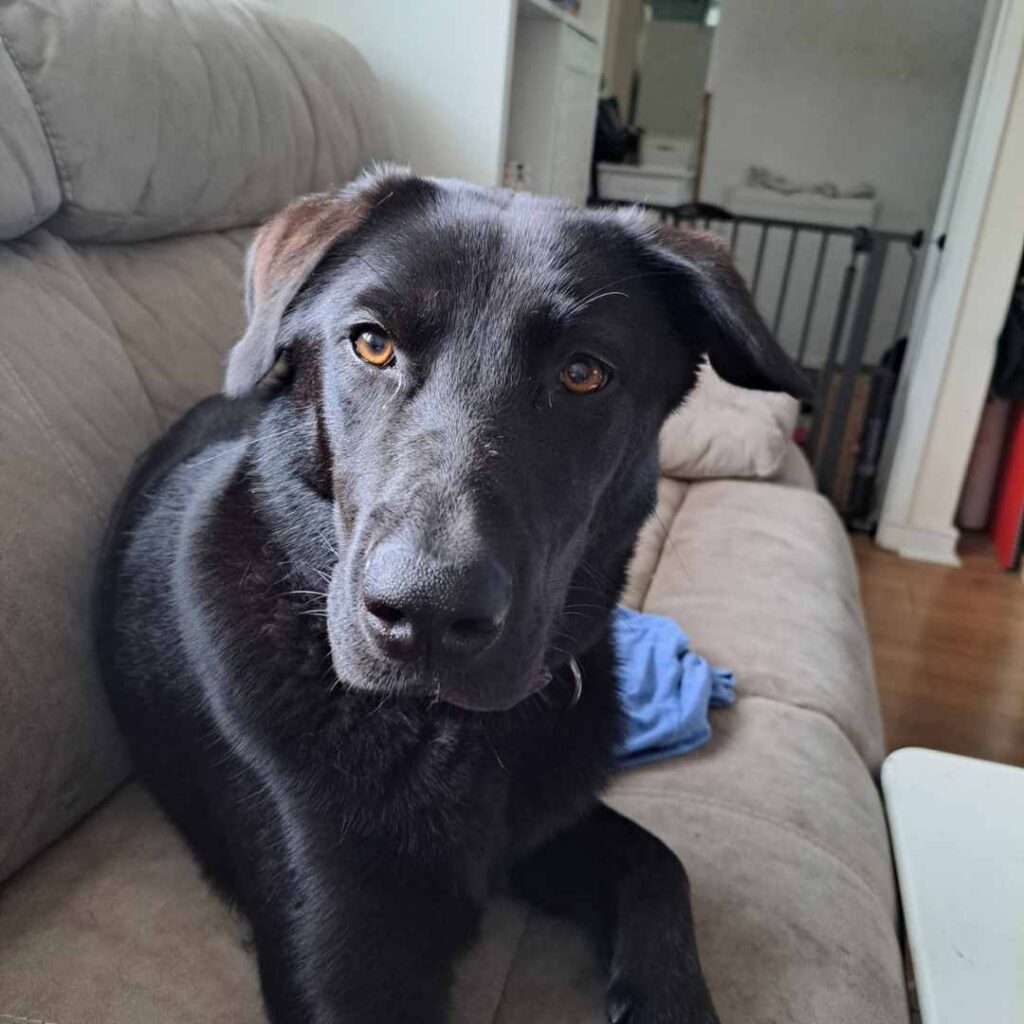
Roxy is a 2 year old black female Shepherd Lab mix. She has ears like Dobby from Harry Potter. Not a floppy as a Lab’s, but not upright like a GSD’s. One picks up like a radar. She has a slightly bushier tail than a Lab. A longer snout like a GSD’s and almond shaped brown eyes.
Roxy is very happy, but also quite anxious. She is scared of things that make noise or are in the wrong place. She was scared of a tyre left in a field once. She’s super playful but happy to chill on the sofa. She wants to be involved in affection shown between humans.
Bentley
Bentley is all black with no markings. He looks like both parent breeds. He has a Lab body with Shepherd ears and stance. He is 2 years old.
He listens to everything and will follow through with commands. Intensely watches television. Lets you know when he wants something. No idea that he’s a dog. He barks at other dogs until he meets them then plays. People he ignores unless they interact first then he loves them.
Hollie (owner Vicky)

1 year old female Hollie is all black, with a small thumb size white dot on her chest. Hollie definitely takes after her chocolate Lab father. She does have a very slight neck ruffle and her ears sit slightly higher on her head, but they flop like her father’s and not stand upright like her mother.
Hollie is basically just a happy dog. She is extremely smart. She learns quickly and is highly food motivated. She’s been playing food rewards games since coming home at 8 weeksm and she learned to sit on a place for her kibble immediately. She is so bright and quick to learn her owner is constantly amazed.
At night time after dinner she is perfectly happy to just cuddle up on the couch and relax. She’s actually the perfect combination of high energy and adventure mixed with understanding how to be calm when the activity is over.
Tove
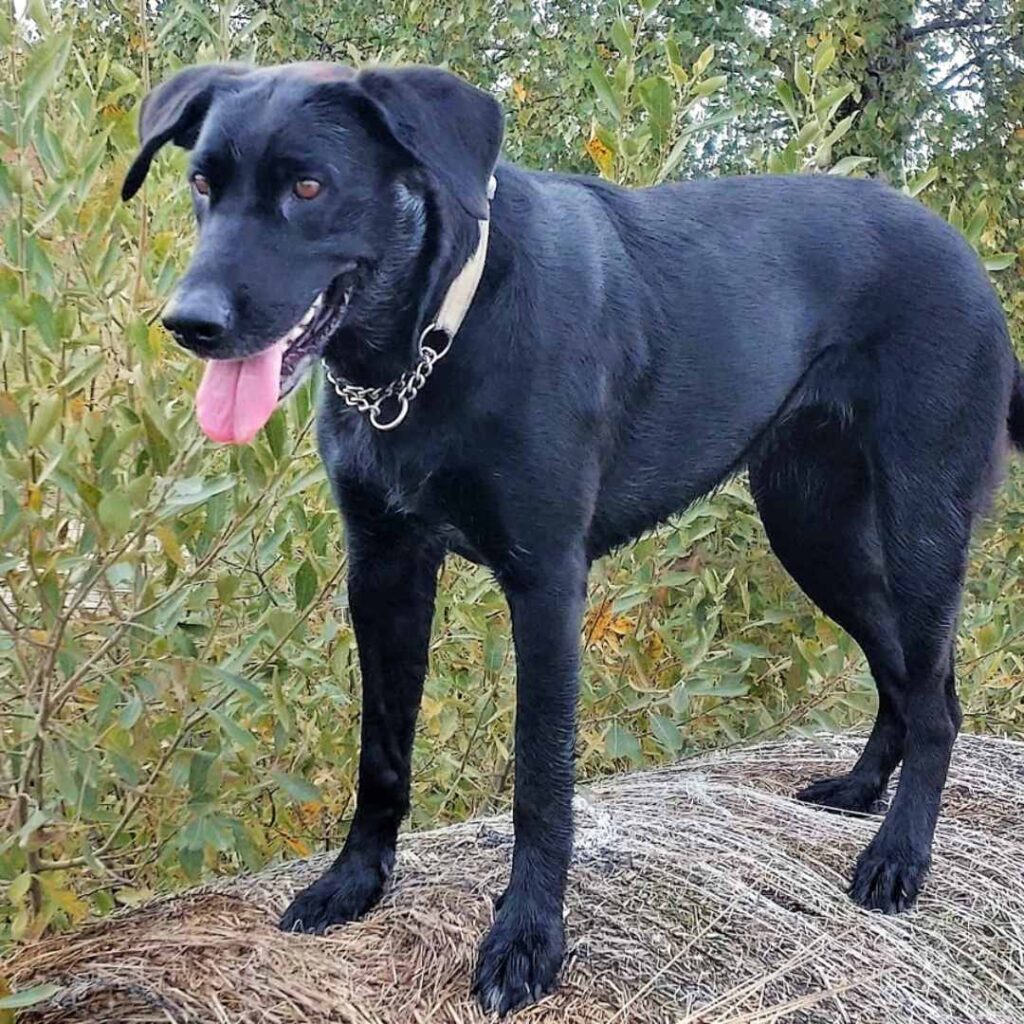
Tove is a female, black, 5 year old German Shepherd Lab mix. She is a playful, food-loving, kind-hearted, yet powerful dog who loves to be out in nature tracking and hunting.
Behavior on walks depends on the situation and who/whom she meets. First of all, it has become calmer with increasing age. The vast majority of meetings go smoothly and well. However, she seems to have a developed sense of whether there is any tension before the meeting, from those we meet, -or perhaps from me as a dog handler. In such situations, it is far more common for the meeting to devolve into dog barking and pulling on the leash. Especially if the oncoming dog starts barking first.
Milo (owner Nicola)
Milo is a male, golden colored Lab mix, who looks like a Labrador but with wonky ears. He is 19 months old.
Hyper is the main word used to describe him. Milo is very protective, barks when anyone comes to the door. He is very clever, wants affection constantly but is not food oriented. On walks with people ok but other dogs goes ballistic.
Buddy (owner Vera)
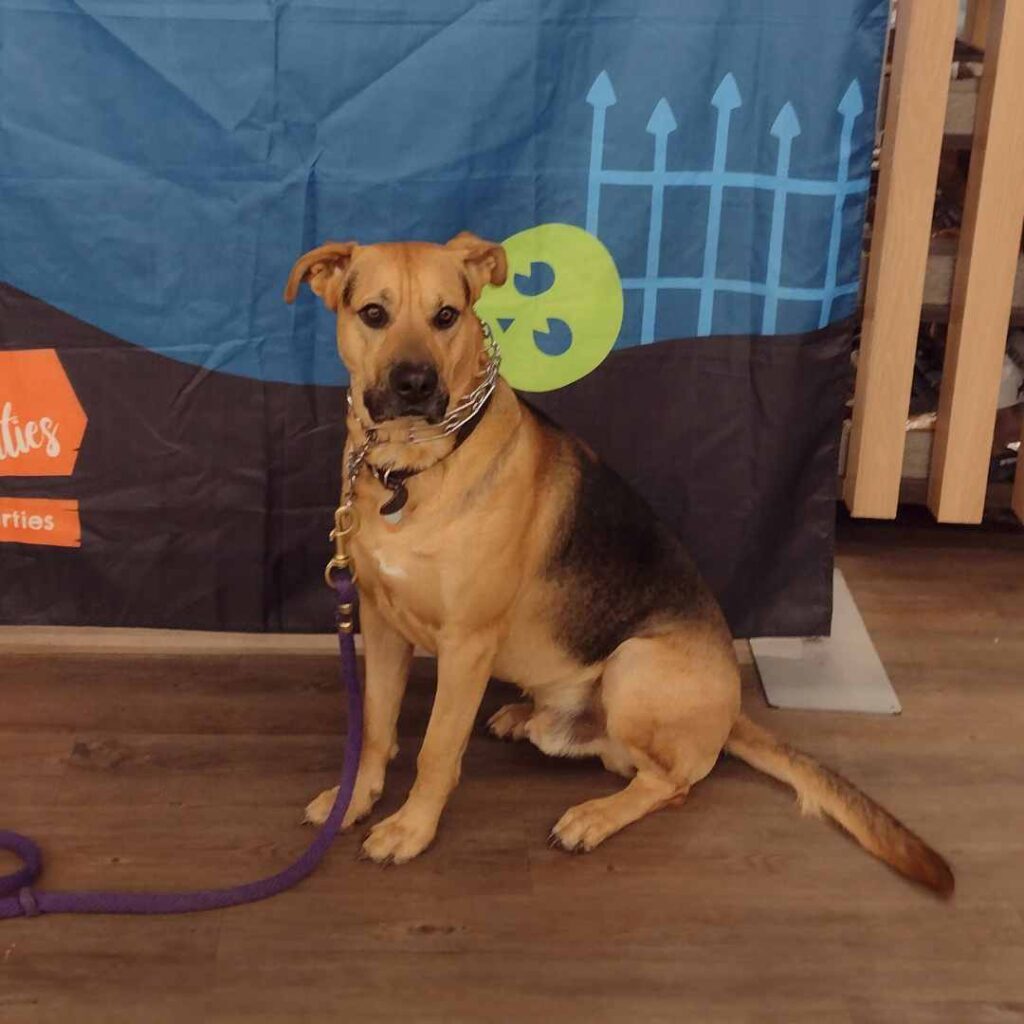
Buddy is a 2.5 year old male, black and tan. He has the Shepherd black saddle with the whole topside being darker. Buddy is smart and goofy at times, love bug and cuddler, but also protective and loves being with us at all times and loves car rides
This dog wants to go up and sniff, but doesn’t always want to be petted.
Buster (owner Elaine)
Buster is a 5 year old black, male. He looks more like his German Shepard mother.
He is fun loving. Loves the outdoors, enjoys playing with his ball and absolutely adores anything to do with water. He still acts like a puppy when he is out. Buster is very protective especially towards the children. He enjoys playing with other dogs but does like to be top dog.
Buster likes to have a sniff of other dogs. He plays with dogs on the beach and field. Although he lets people stroke him but is wary if people walk funny and he doesn’t like it if people stand still in front of us on walks. He is guarded if he doesn’t trust a person.
Athena (owner Floyd)
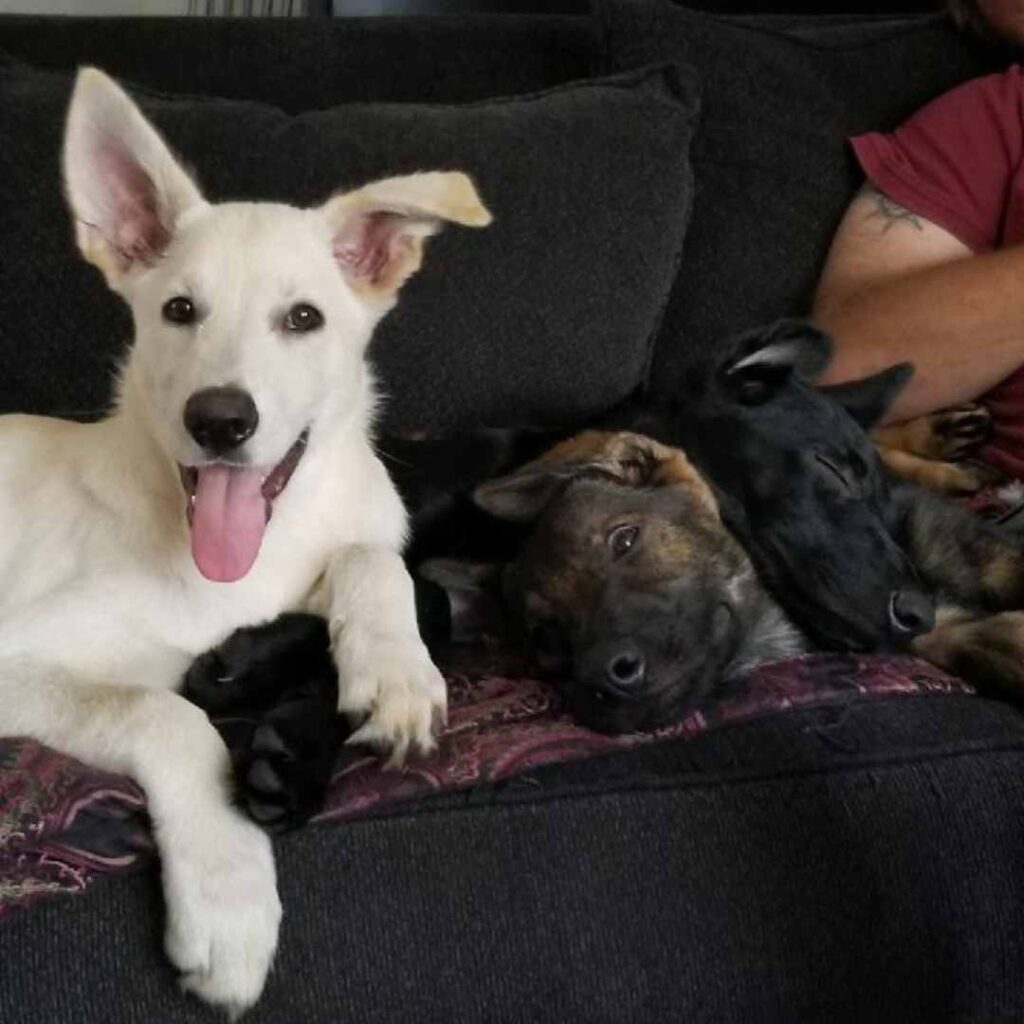
Athena is a 4 year old white female Sheprador. She’s a very calm dog but loves attention. She is very well behaved.
Finn (owner Bethany)

Seven month old black male Finn is black with brown German shepherd leg markings. He looks like a shepherd but with Labrador ears. Finn is a fun loving, affectionate, chaotic good boy. He always wants to play and say hello to everyone. Sometimes barks at dogs, but just to get their attention to say hello.
Common German Shepherd Lab Mix Personality Traits
Most German Shepherd Lab mix owners that we heard from described their dog as loving and energetic, but the results in general were surprisingly diverse.
Here were the top characteristics owners assigned to their pets:
- Loving
- Energetic
- Protective
- Likes to be together
- Exciteable
- Food lover
Other personality traits that came up fairly often for Shepradors included:
- Bouncy
- Keen to please
- Loves everyone
- Loves children
- Shy of strangers
- Anxious
There were some traits that came up a handful of times, including:
- Confident
- Relaxed
- Reactive
- Gentle
- Independent
Only a small handful of owners described their dogs as being calm, submissive, nervous, aggressive or nervous of children specifically.
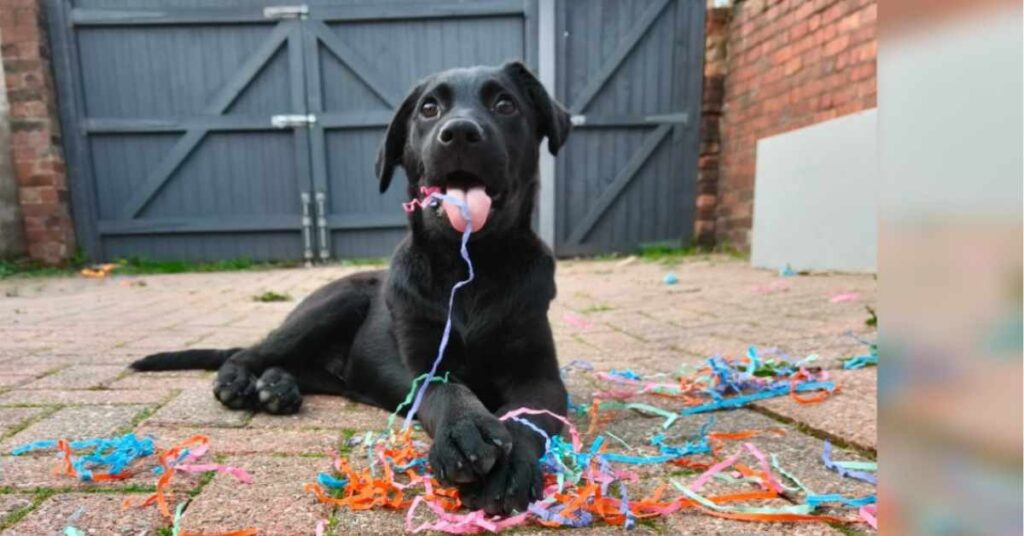
We asked our owners – Does your dog’s coat need any special or regular care?
Most of our Shepherd Lab mixes were brushed at least once a week, and were high shedders. However, a couple of them had quite low maintenance coats.
Have you done much training with your German Shepherd Lab mix?
Most owners feel that their dogs are very trainable and intelligent. Basic commands were started early for most of the dogs that arrived as puppies, and understandably those that adopted older dogs experienced more challenges on this front. Several dogs had advanced training skills or activities including sniffer dog training, dock diving and even sled dog work.
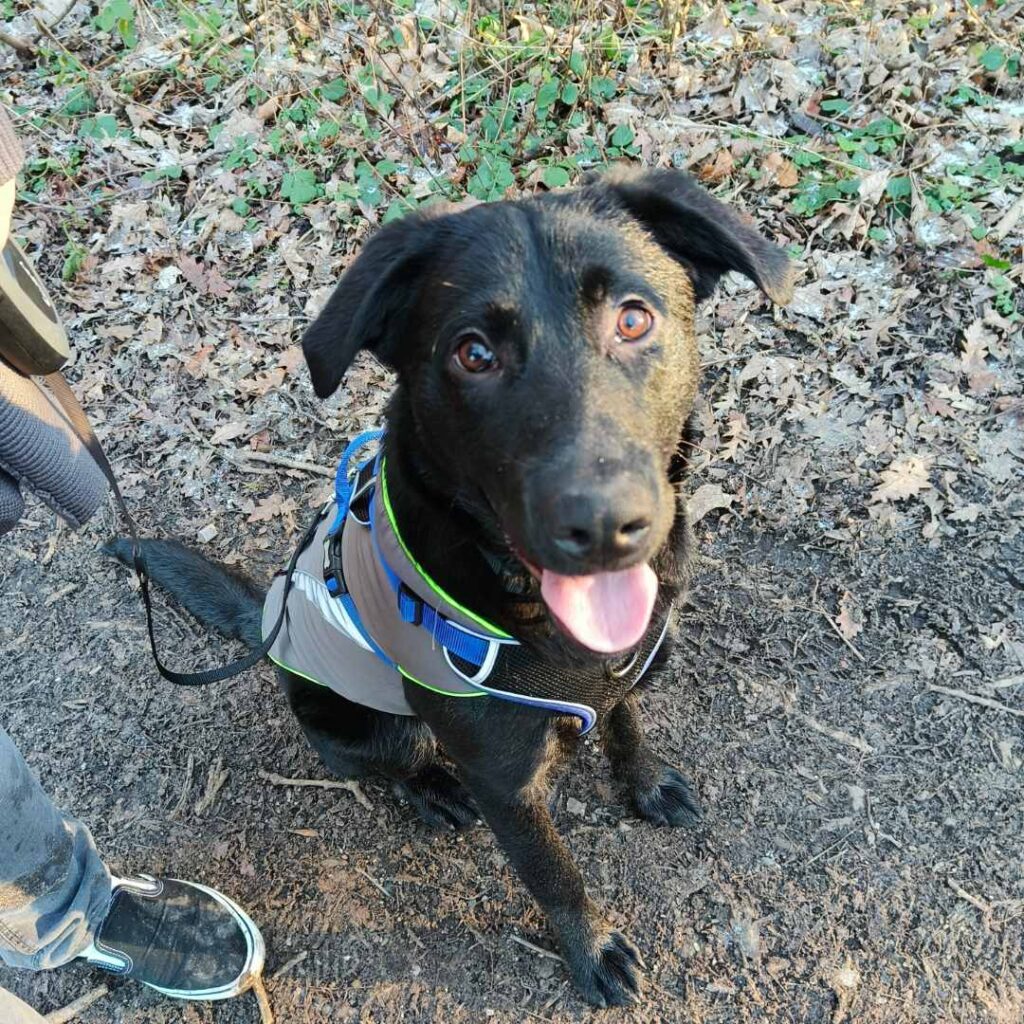
Is your dog happy to be left home alone for a few hours, a few times a week?
Most of our Shepradors were happy to be left alone for a few hours, either crated or in the house with some sort of background noise. However, there were some incidences of separation anxiety that needed to be managed.
Looking at health
Most owners felt that their dogs were generally healthy. However a few things did crop up including ear infections, stomach upsets, ACL, knee, hip and shoulder problems.
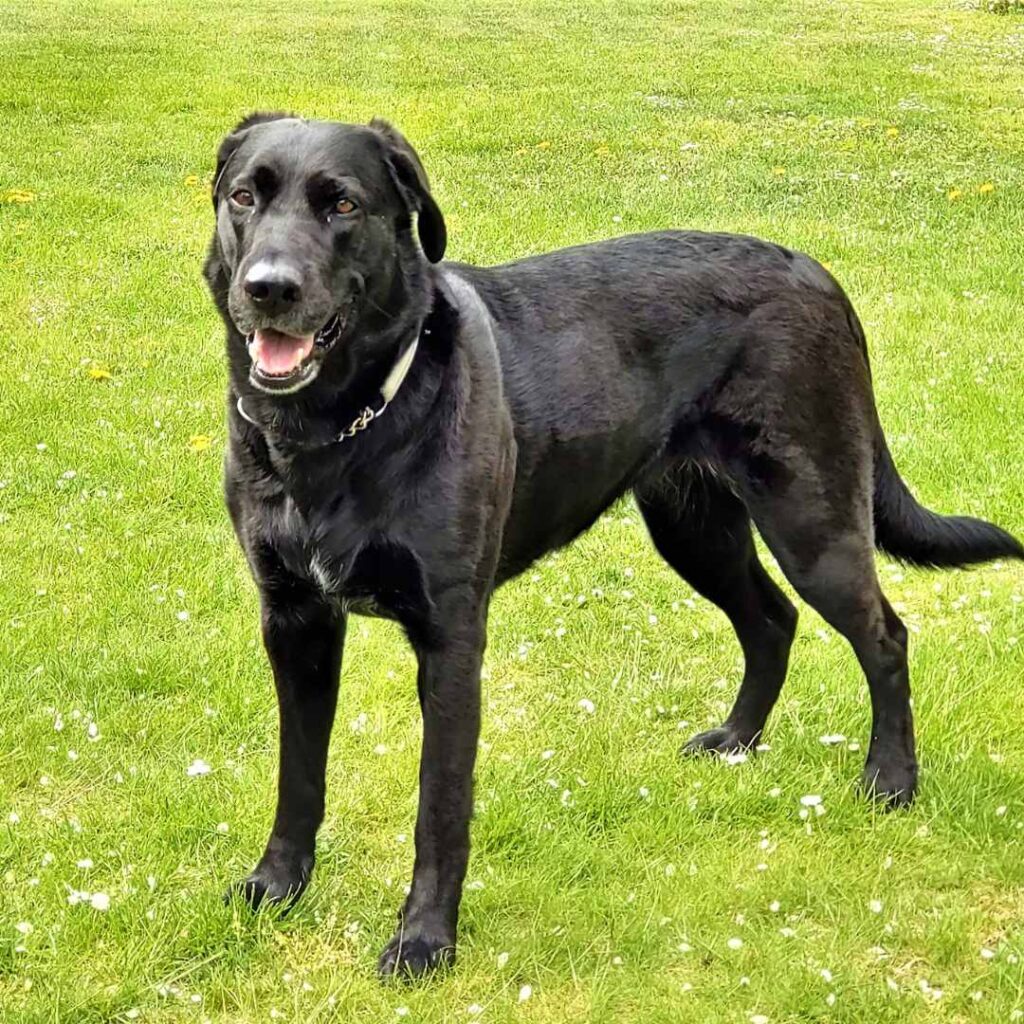
Is there anything you find hard about life with your dog?
Very few dogs present no challenges at all to their owners, but most issues owners had with their pets in this survey round were pretty standard ones that could apply to owners of any breed or mix. Early morning wake ups, whining, barking,
Issues that could be more linked to one of the parent breeds included high prey drive, being an escape artist, restlessness, rough play and even over intelligence.
What do you love most about life with your dog?
When it comes to the highs or this mixed breed, the word loving came up a wonderful amount. Warmth, attentiveness, companionship and affection were very common themes.
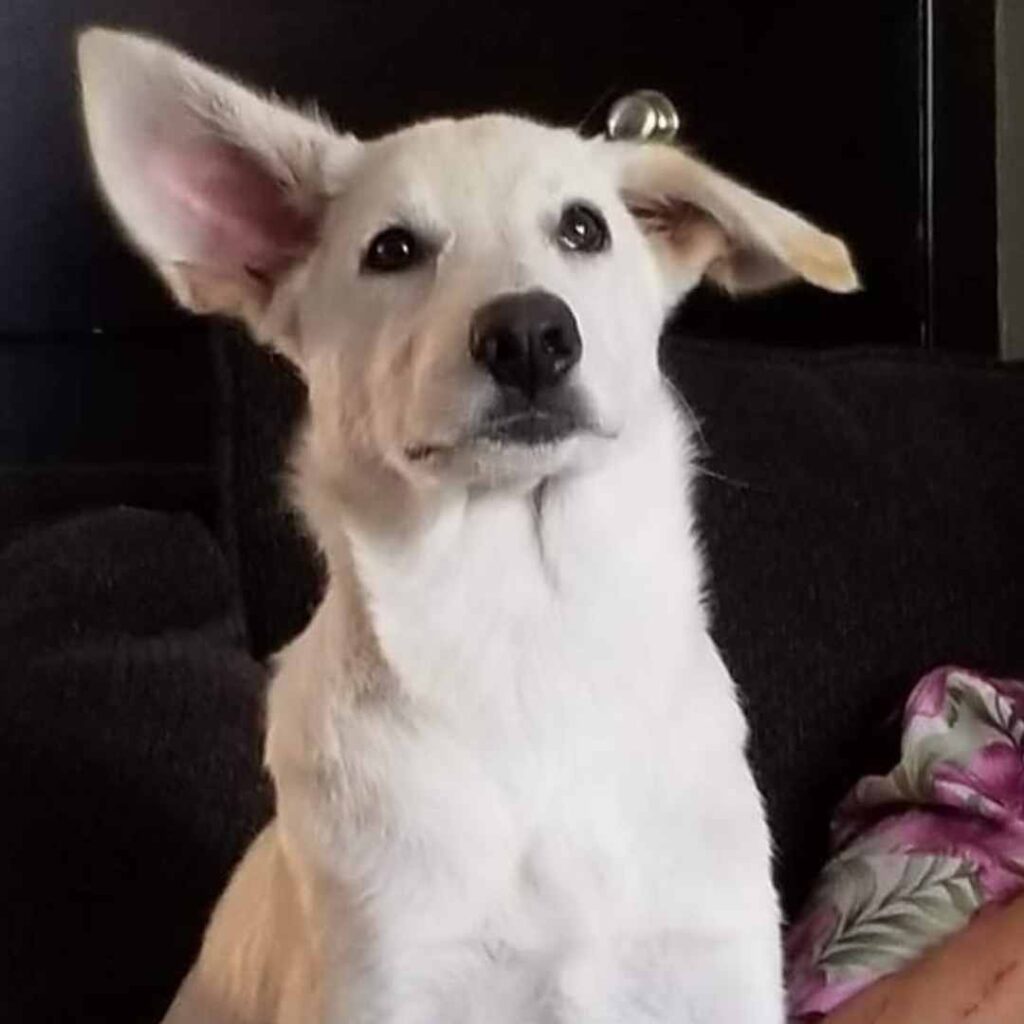
Lastly…is there anything you think prospective owners should know, about life with a German Shepherd Lab mix?
Finally, here are some words of advice from our established Shepherd Lab mix owners.
Sierra’s owner Carolyn says
Love them as you would any dog. Just research the breeds and know what they are all about. But we are very happy we rescued her and that she is part of our life. Even with all her craziness.
Milo’s owner Nicola says
I’ve had Lab/Boxer, pedigree Lab , Lab/Pointer but Milo being a Lab/German shepherd is the most taxing.
Bentley’s owner says
They will fill your life with love.
Buster’s owner Elaine says
Be prepared for the high energy levels. The need for exercise and mind games to keep them active and out of mischief. Also the constant shedding of fur, I wasn’t prepared for how much they actually shed lol.
Buddy’s owner Vera says
I would say early socializeing and basic obedience training mine has the Shepard protective streak.
Athena’s owner Floyd says
Very energetic when young, require a lot of exercise. Also very loving, loyal, and protective when they need to be.
Finn’s owner Bethany says
Be prepared for crazy moments of zoomies, eating anything that isn’t nailed down, and chewing everything in sight . In return you will get a loyal best friend
Willow’s owner Bev says
Expect the unexpected!
Pepper’s owner Jeannette says
Make sure you keep her life busy and interesting.
Rocky’s owner says
Socialize, enrich, and build confidence! Especially if it’s a shepherd mix. Shepradors are ACTIVE. All dogs need mental, emotional, and physical stimulation. Shepradors can run for miles and not get tired. Please do breed research, it’s very important. Different dogs have different instincts.
Roxy’s owner Naomi says
They need lots of exercise and benefit from training. They love water, balls and food.
Hollie’s owner Vicky says
I think it’s important to know the traits of both primary breeds. Hollie looks like a lab but a lot of her behaviour is shepherd dominant so training her as a shepherd seems to work well. I thought as a retriever she would like retrieving but she seems to enjoy scent work and searching better. We play more search and reward food games and this works for her mental enrichment.
Tove’s owner says
That one should be aware that it is always more difficult to know which characteristics the mix will inherit from the respective parent individual and respective breeding line.

Free Labrador Updates!
Get my training tips, news, reviews, and the latest from The Labrador Site delivered to your inbox



My shepherd door is 5 months old She’s very energetic to say the least And she is very loving I do socialize her literary little worry of people at 1st likes to pee.. And don’t like deliveries Very high tuned to security at night Loves to be around kids And she is also my service dog She lets me know if I’m gonna go hyperglycemic Overall best decision I ever made And I didn’t know that about the hair but thanks 40 pounds 5 months
My female black lab recently mated with a German Shepard. And I now am the proud parent of a 4 week old Sheprador. He’s a boy and already on the bigger size of puppies his age. Very smart already learned where to relieve himself. I am not aiming for over night house training yet but it seems he’s already picked that up on his own. I see a lot of his dad’s traits in him though he is gentle and quiet. I will let you know as he grows how he evolves into his own character and behavior.
I have MS and want a Sheprador. My son now has a cat and I am sure that being a cat will not like a dog in the house. So he must learn!!
I want a rescue Sheprador. I would prefer a female o balance the hormone ratio.
Do you have any suggestuions ?
Regards Rhonda Faithfull
Do you have any puppies or dogs for adoption. Where are you located?
I do have some for adoption if your looking still!
My GSD/Lab mix was rescued when she was just 5 months old. She’s great and super intelligent. It’s amazing on how well she communicates her needs. When I walk her on the streets she’s all Lab. Friendly and thinks everybody was put on this earth to play with her. However, let a stranger come to the door and the GSD in her comes out. Great guard dog of her environment. Doesn’t like delivery people on her property. Sheds a ton, loves to play and knows her needs. My only complaint is the constant whining. I understand it’s her mode of communication with us. But at times she just whines for no reason or at least none known to us.
Oh, and she weigh in at 80 lbs as well.
What is the best food to feed my dog who is 1 year old and is a black lab-Germen Shepherd mix.
I have a one year old Sheprador. Mom was a white GSD and dad a yellow lab. She is sweet and very smart. I agree with everyone that these dogs are excellent additions to most families but you must be willing to put in the work of training and exercising. When my pup gets bored, she can be destructive. We are also working on socializing with people. Because of her background before I rescued her, she is very nervous around new people. Honestly though, she is funny and sweet and just generally a wonderful dog.
I rescued my German shepherd golden lab mix at a year old. He is highly intelligent, very sweet, and if I had a bad day will do whatever cute funny thing he has to to make me feel better.
He is very much a cuddle or and likes to prove himself as a hunter by chasing squirrels to our yard and twice says caught and brought me dead squirrels very proud of himself because he provided for me. I would highly recommend this mix to anyone looking for a good companion dog and a great protector.
I live in a fairly safe area but there have been a couple of times when I have been walking him that people who seemed semi-dangerous came around and he automatically from the 1st time we walked was defensive and tried to keep them from me.
I rescued my “Sheprador”, I love calling her that, almost 2 years ago. She is now 3.5 and we have been so happy with her. It’s just myself and my 3 daughters and she is great with them and helps us feel safe. She is great around most people and animals but is hesitant towards males. She escapes our fence sometimes and will run so fast for a few hours and come right back home. She usually stays within a few block radius, running by every time I whistle for her. We live on the outside of a small town and the neighbors all love her. She does like to chew paper products and takes her chance whenever she can get into the garbage. She’s been easy to train the basics, and does very well when I board her. She plays with the other dogs so well, it’s so fun to see the pictures they send of their puppy day care. It truly is important to give them a ton of exercise and affection. Our Pearl, is black lab mix so she is full of thick medium length hair, that kind of looks like iridescent in the sun, with tans, whites and gray under the surface layer. She is gorgeous! Also has a white spot on her chest that must have cake from her lab parent! I’m unsure of how much % she is made up of. But she looks just like the pictures I‘ve looked up.
Oh and she weighs 74 pounds!
Does anyone know a reputable GSD/Lab breeder?
had a shep lab mix until two years ago. Was the smartest dog I ever owned. I lost my lab a couple weeks ago. I always like having two dogs at the same time. When I go to the grocery store or anywhere else they always have company with each other. Looking for a lab shep mix again, hard to find. Will get a lab also. They are the greatest dogs.
We adopted a 2 year old GSD/lab mix. Has the sweetest lab face but fur pattern & tail of a gsd with the black/brown Saddleback pattern. Doesn’t bark, gets along with everyone and every single guest that has come over has loved him and love to play with him. Just loves to cuddle all day and play with a size 1 soccer ball. We live on a farm style property so hes never on a leash and he’s just a curious wanderer trying to catch different animals everyday to try and play with them(actually caught him playing with a deer once and I was shocked how they got along). His behaviour is very lab dominant. Couldn’t have made a better dog than him in a laboratory if you wanted to. Chico is a blessing to have as our first dog and to come into a house that didn’t like dogs because they were afraid, he turned everyone into a dog lover; just a big old love bug that and sheds enough to make carpets every other week